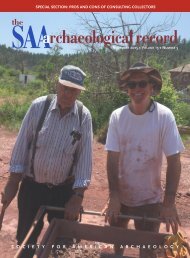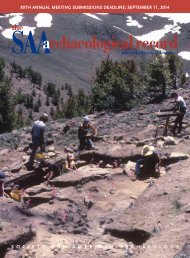SAA
Nov2016_web
Nov2016_web
You also want an ePaper? Increase the reach of your titles
YUMPU automatically turns print PDFs into web optimized ePapers that Google loves.
VIDEO GAMES AND ARCHAEOLOGY<br />
VIDEO GAMES IN ARCHAEOLOGY<br />
ENJOYABLE BUT TRIVIAL?<br />
Angus Mol, Csilla Ariese-Vandemeulebroucke, Krijn Boom, Aris Politopoulos,<br />
and Vincent Vandemeulebroucke<br />
Angus Mol is a postdoctoral researcher in the field of archaeological network approaches at the Department of Anthropology, Stanford University,<br />
Stanford, California. Csilla Ariese-Vandemeulebroucke is a Ph.D. candidate in the field of museum studies at the Faculty of Archaeology, Leiden University,<br />
Netherlands. Krijn Boom is a Ph.D. candidate in the field of archaeological heritage management at the Faculty of Archaeology, Leiden University,<br />
Netherlands. Aris Politopoulos is a Ph.D. candidate in the field of archaeology of the Near East at the Faculty of Archaeology, Leiden University,<br />
Netherlands. Vincent Vandemeulebroucke is an independent video game researcher in the Netherlands.<br />
The thrill of discovery and exploration combined with<br />
the opportunity to relive the past is something that<br />
appeals both on an instinctive and emotional level.<br />
Video games have played into this desire in several ways. As<br />
with many instances of popular media appropriation of specialized<br />
fields, archaeologists are critical of how their discipline,<br />
as well as past places, people, and cultures, are portrayed.<br />
However, as also argued by other contributors in this<br />
special issue, we feel that archaeology and video games can<br />
be combined in ways that have a positive impact on society,<br />
education, and research. This is why, early in 2015, we<br />
founded the research group VALUE: Videogames and<br />
Archaeology at Leiden University. Even if video games are<br />
not on the radar as a serious research subject, this does not<br />
mean that there is no interest in the topic among individuals.<br />
Therefore, one of the first projects we undertook was a<br />
survey that charted the interest in and appreciation of games<br />
that incorporate archaeological and historical themes among<br />
students and professionals.<br />
Survey<br />
This survey was conducted in February and March 2015 at<br />
the Faculty of Archaeology, Leiden University. 1 One of the<br />
key questions was how many people at our faculty played<br />
video games and, if so, if they also played historical and<br />
archaeological games. Secondly, we sought to get an understanding<br />
of the perceived relevance of video games for<br />
archaeology and vice versa. Finally, we wanted to see whether<br />
people would be interested in actively taking part in future<br />
research within the field of archaeogaming.<br />
We asked both bachelor and master students (123 students,<br />
average age 21 years old) as well as staff members (46 staff,<br />
average age 31 years old) to fill out the survey. In total, we collected<br />
169 questionnaires, which contained both closed and<br />
open questions, as well as rating scales. The first half of the<br />
survey focused on playing video games in general: genre<br />
preference, gaming platforms, time spent on games, and<br />
preferred gaming elements. The second half was aimed<br />
more specifically at the intersection of archaeology and video<br />
games. These questions were aimed at uncovering the enjoyability,<br />
importance, and representativeness of archaeology in<br />
games.<br />
The majority of the respondents, 69 percent, stated that they<br />
play video games. There was a difference between staff<br />
members, roughly half of whom play video games, and students,<br />
three-quarters of whom are gamers (see Figure 1).<br />
Interestingly, there is no gender gap in absolute numbers<br />
among these gamers. There is, however, a percentage difference<br />
in the gender of non-gamers, with the majority being<br />
female. Additionally, on average, women indicated that they<br />
spent less time per week playing video games, roughly under<br />
6 hours. Male respondents play video games from 2 to 10<br />
hours on average per week. Overall, the respondents cover a<br />
wide spectrum from hardcore gamers to more casual players,<br />
some having several pieces of dedicated gaming equipment<br />
(dedicated PCs or laptops, consoles, etc.), while others<br />
mainly play browser or smartphone games.<br />
Archaeologists enjoy a variety of genres, with strategy games<br />
and massively multiplayer online role-playing games<br />
(MMORPGs) being the most popular. Exploration (68 percent),<br />
November 2016 • The <strong>SAA</strong> Archaeological Record<br />
11




